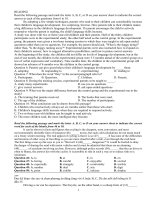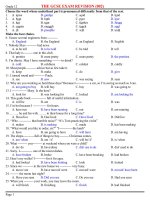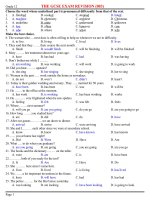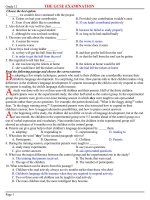GCSE 316
Bạn đang xem bản rút gọn của tài liệu. Xem và tải ngay bản đầy đủ của tài liệu tại đây (69.88 KB, 5 trang )
SƠ GD&ĐT VINH PHUC
TRƯƠNG THPT LIÊN SƠN
(Đề thi gồm: 05 trang)
ĐỀ KTCL ƠN THI THPT QUỐC GIA NĂM 20182019
Mơn: TIẾNG ANH – ĐỀ SỐ 316
Thời gian làm bài: 60 phút, không kể thời gian phát
đề
Ho va tên thi sinh:……………………………………………………………………. SBD:…………………………
Mark the letter A, B, C, or D on your answer sheet to indicate the word whose underlined part
differs from the other three in pronunciation in each of the following questions.
Question 01: A. attract
B. across
C. actor
D. factor
Question 02: A. collect
B. concept
C. conceal
D. consume
Mark the letter A, B, C, or D on your answer sheet to indicate the word that differs from the
other three in the position of primary stress in each of the following questions.
Question 03: A. introduce B. volunteer
C. understand
D. mechanized
Question 04: A. mushroom B. mountain
C. movement
D. moustache
Mark the letter A, B, C, or D on your answer sheet to indicate the underlined part that needs
correction in each of the following questions.
Question 05: It was not until the late 1970s when these country people could enjoy the benefits of
electricity.
A. not until
B. when
C. these country people could enjoy
D. benefits
Question 06: Neither the director nor any members of the staff is working overtime today.
A. Neither
B. nor any
C. is
D. overtime
Question 07: A big wedding requires a lot of preparation, such as sending invitations, hiring
costumes and choose dishes.
A. requires
B. preparation
C. sending invitations
D. choose
Mark the letter A, B, C, or D on your answer sheet to indicate the correct answer to each of the
following questions.
Question 08: A: Do you mind if we schedule the meeting for 11 o’clock?
B: Well, actually, I________ earlier.
A. will prefer it
B. would prefer it to be
C. am preferring
D. should prefer it will be
Question 09: This statue is a lifelike________ of Christ Jesus.
A. presentation
B. presenting
C. representation
D. representative
Question 10: My brother had his camera________ from his car in the office car-park.
A. lost
B. robbed
C. missed
D. stolen
Question 11: The living conditions in the rural areas of the country________ during the past five
years.
A. have been improved B. had improved C. had been improved
D. were improved
Question 12: ASEAN________ Association of Southeast Asian Nations, a regional organization which
promotes intergovernmental cooperation and facilitates economic integration amongst its
members.
A. takes over
B. stands for
C. represents as
D. replaces with
Question 13: It is not________ to be drunk in the street.
A. respecting
B. respectably
C. respectful
D. respectable
Question 14: All his plans for starting his own business fell________.
A. in
B. through
C. down
D. away
Question 15: I had a________, which I couldn’t explain, that something terrible was going to happen
A. feeling
B. view
C. sense
D. thought
Question 16: He will do the work and then send you the________ for it.
A. addition
B. sum
C. note
D. bill
Question 17: The man who lives opposite us sometimes comes________ for a cup of coffee.
A. over
B. off
C. on
D. to
Question 18: Being well-dress and punctual can help you create a good________ on your interview.
A. effectiveness
B. pressure
C. employment
D. impression
Question 19: ________ hard he has worked, he hardly supports his family of ten people.
A. However
B. Although
C. Despite
D. In spite
Mark the letter A, B, C, or D on your answer sheet to indicate the most suitable response to
complete each of the following exchanges.
Question 20: – Mr. Black: “What shall I do when I want to call you?” – Nurse: “_____________”
A. You shall find the red button.
B. Press the red button on the left.
C. I’d come every ten minutes
D. Stay here and enjoy yourself.
Question 21: – Customer: “Can I have a look at that pullover, please?” – Salesgirl: “___________”
A. It’s much cheaper.
B. Which one? This one?
C. Sorry, it is out of stock.
D. Can I help you?
Mark the letter A, B, C, or D on your answer sheet to indicate the word(s) CLOSEST in meaning
to the underlined word(s) in each of the following questions.
Question 22: We decided to pay for the furniture on the installment plan.
A. monthly payment B. cash and carry
C. credit card
D. piece by piece
Question 23: The last week of classes is always very busy because students are taking
examinations, making applications to the University, and extending their visas.
A. hectic
B. eccentric
C. fanatic
D. prolific
Mark the letter A, B, C, or D on your answer sheet to indicate the word(s) OPPOSITE in
meaning to the underlined word(s) in each of the following questions.
Question 24: At school, people always used to take the mickey out of him for having red hair.
A. to say he is like Mickey Mouse
B. to tease or make fun of
C. to hurt someone badly
D. to give a compliment
Question 25: The girl has a bazillion clothes already, she does not need to buy any more.
A. a great deal of
B. a heap of
C. a good number
D. a small amount
Mark the letter A, B, C, or D on your answer sheet to indicate the sentence that is closest in
meaning to each of the following questions.
Question 26: “We lost the last game because of the referee”, said the team captain.
A. The team captain refused to tell the referee about their loss in the last game.
B. The team captain admitted to the referee that they had lost the last game.
C. The team captain blamed the referee for their loss in the last game.
D. The team captain said that without the referee, they might have lost the last game.
Question 27: For a cold, doctors often recommend that you rest and drink lots of fluids.
A. The doctors recommend that you have cold soft drinks.
B. Doctors would rather give advice about colds than about fluids
C. Rest and liquids are frequently advised for treatment of colds.
D. You were told to come in out of the cold and rest.
Question 28: “You shouldn’t sit up until you feel better.” the doctor said to me.
A. The doctor ordered me to sit up if I wanted to feel better
B. The doctor advised me not to sit up until I feel better.
C. The doctor told me that if I wanted to feel better, I should sit up.
D. The doctor suggested I should sit up until I feel better.
Mark the letter A, B, C, or D on your answer sheet to indicate the sentence that best combines
each pair of sentences in the following questions.
Question 29: I didn’t know that you were at home. I didn’t drop in.
A. I didn’t know you were at home although I didn’t drop in.
B. Not knowing that you were at home, I didn’t drop in.
C. If I knew that you were at home, I would drop in.
D. Not knowing that you were at home, but I still dropped in.
Question 30: We spray pesticides and fertilizers on our crops. Some pesticides and fertilizers are
found dangerous.
A. We spray pesticides and fertilizers, which are found dangerous, on our crops.
B. The pesticides and fertilizers we spray on our crops are to be found dangerous.
C. We spray pesticides and fertilizers on our crops, which is found dangerous.
D. Some of the pesticides and fertilizers we spray on our crops are found dangerous.
Read the following passage and mark the letter A, B, C, or D on your answer sheet to indicate
the correct word or phrase that best fits each of the numbered blanks from 31 to 35.
CARE was (31)_______ in 1945 to help people after World War II. It distributed over 100
million food (32)_______. Meanwhile, it was starting self-help programs. Today it has development
programs in 37 countries. CARE gives equipment and (33)_______ people how to build water
systems, roads, schools and health centers. It also teaches people how to increase production on
farms, how to reforest areas, and how to (34)_______ small village industries. Doctors and nurses
volunteer to go to villages. They provide health care for the people. They also teach people how to
improve their health. They train people to provide (35)_______ medical care. CARE also provides
food for about 30 million people every year. Most of them are children. It gives special help where
there is a flood, an earthquake, a drought or a war
Question 31: A. founded
B. build
C. found
D. constructed
Question 32: A. packages
B. wraps
C. parcels
D. pieces
Question 33: A. says
B. tells
C. orders
D. informs
Question 34: A. start
B. begin
C. take up
D. turn on
Question 35: A. elementary
B. only
C. easy
D. primitive
Read the following passage and mark the letter A, B, C, or D on your answer sheet to indicate
the correct answer to each of the questions from 36 to 42.
LEVELS OF VOCABULARY
Most languages have several levels of vocabulary that may be used by the same speakers. In
English, at least three have been identified and described.
Standard usage includes those words and expressions understood, used, and accepted by a
majority of the speakers of a language in any situation regardless of the level of formality. As such,
these words and expressions are well defined and listed in standard dictionaries. Colloquialisms,
on the other hand, are familiar words and idioms that are understood by almost all speakers of a
language and used in informal speech or writing, but not considered acceptable for more formal
situations. Almost all idiomatic expressions are colloquial language. Slang, refers to words and
expressions understood by a large number of speakers but not accepted as appropriate formal
usage by the majority. Colloquial expressions and even slang may be found in standard
dictionaries but will be so identified. Both colloquial usage and slang are more common in speech
than writing.
Colloquial speech often passes into standard speech. Some slang also passes into standard
speech, but other slang expressions enjoy momentary popularity followed by obscurity. In some
cases, the majority never accepts certain slang phrases but nevertheless retains them in their
collective memories. Every generation seems to require its own set of words to describe familiar
objects and events.
It has been pointed out by a number of linguists that three cultural conditions are
necessary for the creation of a large body of slang expressions. First, the introduction and
acceptance of new objects and situations in the society; second, a diverse population with a large
number of subgroups; third, association among the subgroups and the majority population.
Finally, it is worth noting that the terms “standard”, “colloquial”, and “slang” exist only as
abstract labels for scholars who study language. Only a tiny number of the speakers of any
language will be aware that they are using colloquial or slang expressions. Most speakers of
English will, during appropriate situations, select and use three types of expressions.
Question 36: Which of the following is the main topic of the passage?
A. Standard speech
B. Idiomatic phrases
C. Different types of vocabulary
D. Dictionary usage
Question 37: How is slang defined by the author?
A. Words and phrases accepted by the majority of formal usage.
B. Words or phrases understood by the majority but not found in standard dictionaries.
C. Words or phrases that are understood by a restricted group of speakers.
D. Words or phrases understood by a large number of speakers but not accepted as formal
usage.
Question 38: The word “appropriate” in paragraph 2 is closest in meaning to _____.
A. old
B. large
C. correct
D. important
Question 39: The word “them” in paragraph 3 refers to________.
A. words
B. slang phrases
C. memories
D. the majority
Question 40: What does the author mean by the statement in paragraph 2: “Colloquialisms, on the
other hand, are familiar words and idioms that are understood by almost all speakers of a language
and used in informal speech or writing, but not considered acceptable for more formal situations.”?
A. Familiar words and phrases are found in both speech and writing in formal settings.
B. Familiar situations that are experienced by most people are called colloquialisms.
C. Informal language contains colloquialisms, which are not found in more formal language.
D. Most of the speakers of a language can used both formal and informal speech in their
appropriate situations.
Question 41: Which of the following is true of standard usage?
A. It can be used in formal and informal settings. B. It is limited to written language.
C. It is only understood by the upper classes.
D. It is constantly changing.
Question 42: The author mentions all of the following as requirements for slang expressions to be
created EXCEPT________.
A. new situations
B. a new generation
C. interaction among diverse groups
D. a number of linguists
Read the following passage on transport, and mark the letter A, B, C, or D on your answer
sheet to indicate the correct answer to each of the questions from 43 to 50.
In addition to the great ridges and volcanic chains, the oceans conceal another form of
undersea mountains: the strange guyot, or flat-topped seamount. No marine geologist even
suspected the existence of these isolated mountains until they were discovered by geologist Harry
H. Hess in 1946.
He was serving at the time as naval officer on a ship equipped with a fathometer. Hess
named these truncated peaks for the nineteenth-century Swiss-born geologist Arnold Guyot, who
had served on the faculty of Princeton University for thirty years. Since then, hundreds of guyots
have been discovered in every ocean but the Arctic. Like offshore canyons, guyots present a
challenge to oceanographic theory. They are believed to be extinct volcanoes. Their flat tops
indicate that they once stood above or just below the surface, where the action of waves leveled
off their peaks. Yet today, by definition, their summits are at least 600 feet below the surface, and
some are as deep as 8,200 feet. Most lie between 3,200 feet and 6,500 feet. Their tops are not
really flat but slope upward to a low pinnacle at the center. Dredging from the tops of guyots has
recovered basalt and coral rubble, and that would be expected from the eroded tops of what were
once islands. Some of this material is over 80 million years old. Geologists think the drowning of
the guyots involved two processes: The great weight of the volcanic mountains depressed the sea
floor beneath them, and the level of the sea rose a number of times, especially when the last Ice
Age ended, some 8,000 to 11,000 years ago.
Question 43: The word “conceal” is closest in meaning to which of the following?
A. hide
B. create
C. erode
D. contain
Question 44: The passage implies that guyots were first detected by means of________.
A. a deep-sea diving expedition
B. computer analysis
C. research submarines
D. a fathometer
Question 45: What does the passage say about the Arctic Ocean?
A. The first guyot was discovered there.
B. It is impossible that guyots were ever formed there.
C. There are more guyots there than in any other ocean.
D. No guyots have ever been found there.
Question 46: The author states that offshore canyons and guyots have which of the following
characteristics in common?
A. Both are found on the ocean floor near continental shelves.
B. Both were formed by volcanic activity.
C. Both were, at one time, above the surface of the sea.
D. Both present oceanographers with a mystery.
Question 47: According to the passage, most guyots are found at a depth of________.
A. between 600 and 3,200 feet
B. more than 8,200 feet
C. less than 600 feet
D. between 3,200 and 6,500 feet
Question 48: According to the passage, which of the following two processes were involved in the
submersion of guyots?
A. Erosion and volcanic activity.
B. The sinking of the sea floor and the rising of sea level.
C. High tides and earthquakes.
D. Mountain building and the action of ocean currents.
Question 49: According to the passage, when did sea level significantly rise?
A. From 8,000 to 11,000 years
B. In the nineteenth century
C. In 1946
D. 80 million years ago
Question 50: What is the author’s main purpose in writing this passage?
A. To describe feature of the undersea world.
B. To trace the career of Arnold Guyot
C. To present the results of recent geologic research.
D. To discuss underwater ridges and volcano chains.
_________THE END__________









